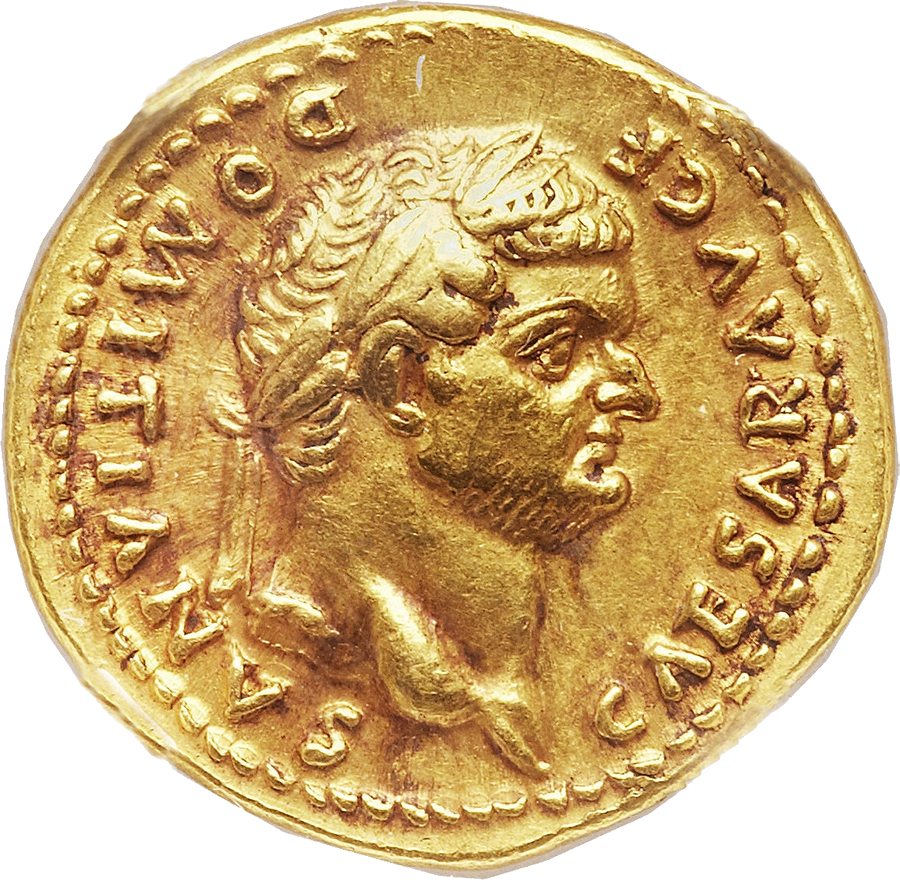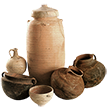
Bible, History, Archaeology
Bible,
History,
Archaeology
Flavius Josephus,
Jewish historian of the 1st century A.D.
Contents:
Introduction – Its history – The Jewish War – Autobiography – Judaic antiquities – Against Apion
Introduction
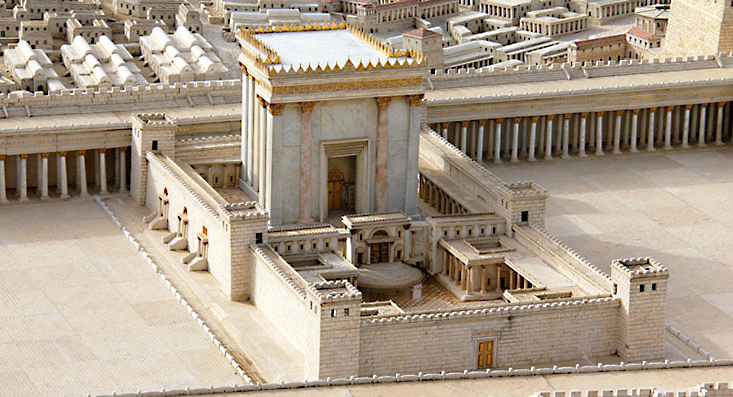 Flavius Josephus (37 - 100) (Yossef ben Matityahu) was a Greek-speaking Jewish historian.
Flavius Josephus (37 - 100) (Yossef ben Matityahu) was a Greek-speaking Jewish historian.
Without the works of Flavius Josephus, we would have had little information about Judea in the 1st and 2nd centuries.
Thanks to him, we now know more about the First Jewish War against the Romans, the situation of Judaism before and after the destruction of the Roman Empire, and the history of Judaism. «Second Temple».
Image opposite: a model of the Temple of Jerusalem erected by Herod the Great. Israel Museum, Jerusalem. Israel Museum.
To the Temples of the Bible page →
Its history
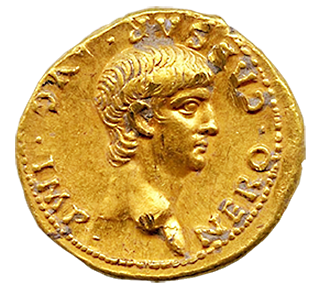
Image opposite: the part, called aureus - The obverse features a portrait of Nero and an inscription: NERO CAESAR AVG IMP: Nero Caesar Augustus Imperator. © University of North Carolina.
The Roman troops are led by Flavius Vespasian and his son Titus, who both went on to become emperors. Convinced of Roman military superiority, he tried to act as an intermediary, earning himself a reputation as a traitor among his own people. Taken prisoner by Vespasian, he predicted his accession to the throne. He was freed in 69 and witnessed the siege, during which he acted as a spokesman for the Romans, and later for Vespasian. the capture of Jerusalem by Titus' troops in 70.
 Image opposite: aureus of Vespasian, Rome, circa 71 AD. Obverse: IMP [erator] CAES[ar] VESPAS[ianus] AVG [ustus]. Laureate head on right. Image © D.R.
Image opposite: aureus of Vespasian, Rome, circa 71 AD. Obverse: IMP [erator] CAES[ar] VESPAS[ianus] AVG [ustus]. Laureate head on right. Image © D.R.
Around 70, Josephus divorced his first wife and married a Jewish woman from Alexandria, with whom he had two children. In 71, he settled in Rome, where he acquired Roman citizenship under the name of Titus Flavius, borrowing the gentilice the Flavians, to whose clientele he belonged.
It was in Rome that he wrote his historical writings, which constitute the main non-Christian source on the Second Temple period in Jerusalem. In particular, he reported on the siege and capture of Massada in 74. Around 75, he divorced again, and contracted a third marriage which gave him two more sons, Flavius Justus and Simonides Agrippa. He died around the year 100.
His main works
 Visit Jewish War
Visit Jewish War
Visit Jewish War against the Romans (Greek Φλαυίου Ἰωσήπου ἱστορία Ἰουδαικοῦ πολέμου πρὸς Ῥωμαίους / Flaouiou Iôsèpou historïa Ioudaïkou polémou pros Rhômaïous): account in 7 books of the last uprising of Judea (66) and of the capture of Jerusalem by Titus (in 70). Originally written in Aramaic, then translated into Greek before publication in 75-79. Written by Josephus, probably with the help of assistants for the Greek edition, from an Aramaic version, which was then translated into Greek. has been taken up and expanded.
Image opposite: obverse: Roman denarius representing Titus (79): IMP T CAESAR VESPASIANVS AVG. Obverse: depiction of a Jewish prisoner kneeling before a trophy: TR POT VIII COS VII © Classical Numismatic Group, Inc.
 Autobiography
Autobiography
Sound Autobiography (in Greek Ἰωσήπου βίος / Iôsepou Bios) where he justifies his choice to have followed the Romans.
It is published as an appendix to the second edition of Judaic antiquities (circa 100), in which he defends his conduct in Galilee in 66 and 67, in the face of fierce criticism from Justus of Tiberias. In it, he contradicts his assertions made in the Jewish War on several points, including his actions and those of his Jewish opponents in Galilee, and the circumstances of their deaths.
Image opposite: Israeli shekel. Dated year III of the first Jewish revolt. 68-69 A.D. The cup is surmounted by the inscription «shekel of Israel». Israel Museum, Jerusalem.
 Visit Judaic antiquities
Visit Judaic antiquities
Visit Judaic antiquities narrative of twenty books, completed in 94 under the reign of Domitian, inspired by the Roman antiquities by Denys of Halicarnassus, adapting the history of the Jewish people to the Roman mentality. The last ten books constitute a historical document of the highest order.
Image opposite: aureus. Domitian as Caesar. Probably struck in 77: CAESAR AVG F DOMIT COS II © Cohen 614v.
Visit Judaic antiquities are particularly important for our knowledge of the Greek and Roman periods in Palestine, as well as for our understanding of the Hasmonean and Herodian dynasties. In it, he contradicts his statements in the Jewish War on several points, such as Agrippa I's accession to the throne and his role in Claudius' accession to the Empire, or his assessment of the procurator Lucceius Albinus.
Against Apion
His latest work. A polemical work in two volumes which is a defense of Jewish traditions and a response to the questions that may have been raised by the publication of Jewish antiques against Greek and Roman Judeophobes. In it, he denies Apion's accusation that Jews had to participate in rituals that led to bloody human sacrifices.

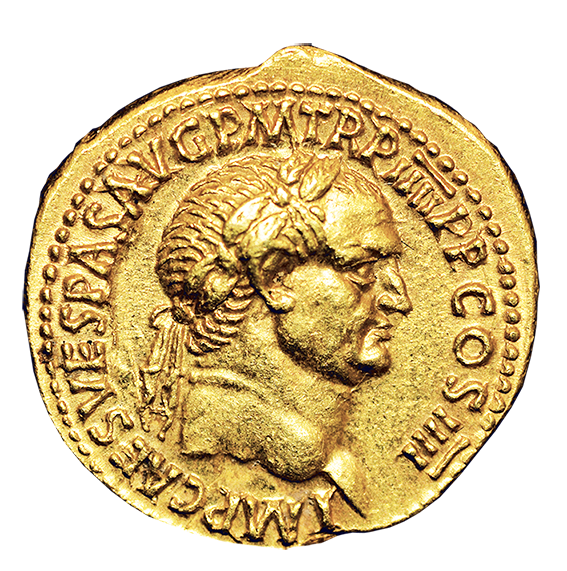 Image opposite: aureus of Vespasian, Rome, circa 71 AD. Obverse: IMP [erator] CAES[ar] VESPAS[ianus] AVG [ustus]. Laureate head on right. Image © D.R.
Image opposite: aureus of Vespasian, Rome, circa 71 AD. Obverse: IMP [erator] CAES[ar] VESPAS[ianus] AVG [ustus]. Laureate head on right. Image © D.R.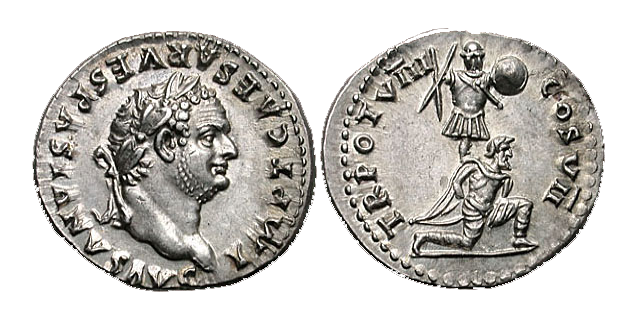
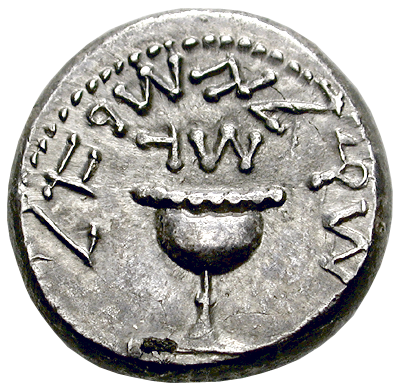 Autobiography
Autobiography